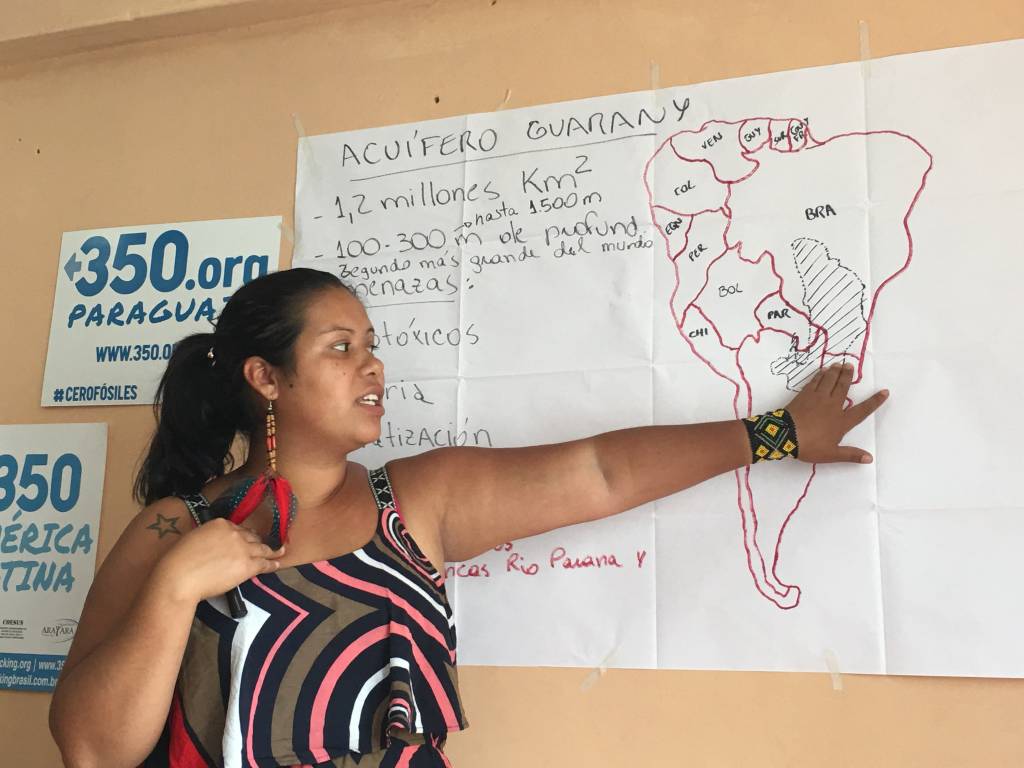By Nicole Oliveira*
Paraguay, a country always presented in history classes as the oppressed neighbor from evil Brazil (which often acted in partnership with England to the benefit of foreign enterprises in detriment to Latin American initiatives), shares with Argentina, Uruguay and Brazil something more than the Paraguayan War and Mercosur: the second largest sweet water reserve in the world – the Guarani Aquifer. This precious resource is now at serious risk of contamination by the oil and gas industry, mainly through the unconventional exploration of shale gas via fracking, which uses a large quantity of highly polluting chemicals.
Sadly, not only the Guarani Aquifer unites us, but also the same challenges: corruption, discrimination, disregard of indigenous rights, land struggle, widespread use of chemicals in GMO crops as well as water contamination and scarcity. For fighting against these challenges and for climate justice, activists from Paraguay, Brazil, Uruguay and Argentina came together in the march in Defense of the Guarani Aquifer, in Uruguay, protesting against drilling for fracking very close to the recharge area of such precious resource. And in that magical moment, the seed for 350 Paraguay was planted.
After dreaming together what fruits this seed would give, Juan Pablo Olsson, 350.org’s Latin America organizer, and Dionicio Benitez, a Guarani leader president of MAIPy (Indigenous Articulation Desk of Paraguay) and founder of a school for homeless indigenous children, gave the first steps for starting to organize in the country. On February 26th, Dioni organized a national gathering of indigenous leaders to launch 350 Paraguay and plan next steps and actions.
We were welcomed with so much love and kindness by Dioni and everyone in the room, it was heartwarming. Some traveled 3 days on a boat. Elders, children, men and women told us about their struggles and challenges in a racist country with severe inequalities. The situation is precarious: villages without water, power, schools, hospitals and roads. Inside me a voice kept saying “how fortunate I am for being part of such unique, and hardly achieved moment!”. Organizing here is challenging in so many unimaginable ways, and yet, nobody seemed to be burdened by it.
“I was very pleased to be able to organize a meeting with indigenous leaders from Paraguay. 350.org brings a wealth of interregional work experience that is very important and will help us so much. It will be great to have contact with other organizations from Brazil, Uruguay and Argentina. It was very interesting the exchange, to hear the others experiences of struggle of other parts in the world. We are looking forward to working together”, said Dioni, now coordinator of 350.org Paraguay.
The cacique Takua, chief of a Guarani and Kayngang tribe from Brazil, located in the state of Paraná, is a smart and strong woman and joined us in this gathering. She was surprised and happy to see so many women taking leadership in the movement, a space not yet conquered in the Brazilian indigenous scene.

Cacique Takua during the meeting
“My village is on top of the aquifer. We drink water from the river. If our water is contaminated, what water will we drink? We are not just fighting for the Aquifer. We are fighting for the rights of the indigenous peoples”, said Cacique Takua during the meeting. Corporations are taking over governments and destroying nature in a very similar organized manner in all the region, so we must get organized as well and act together locally and globally to protect our precious water, we all concluded.
The local group, launched in the capital city Asunción, Paraguay, will be coordinated by indigenous leaders from the whole country. Also, the group will be part of the work in defense of the Guarani Aquifer and the effort of 350.org to expand the Fossil Free campaign to all regions of the planet.
On March 8th, we will all meet again in the northern part of the country, Chaco, where fossil fuel companies are planning to drill for oil and gas, to march together to demand land demarcation, better life conditions and the protection of the water. This is pure climate justice. This is how fossil free looks like there.
*Nicole Oliveira is the Latin America Team Leader